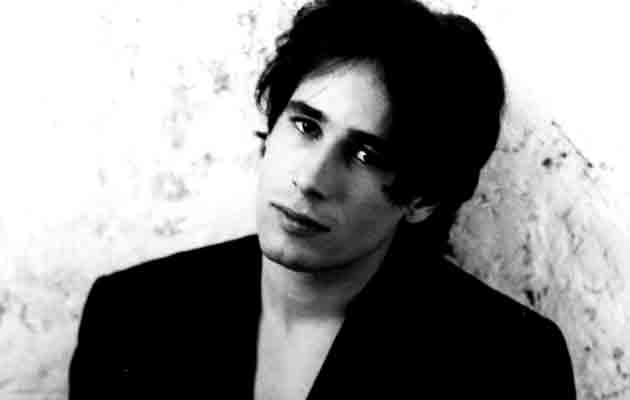https://www.youtube.com/watch?v=dN5pycI843k
Buckley signed with Columbia Records on October 29, 1992. The lure was a promise of artistic freedom, but their historic catalogue (Dylan, Springsteen, Cohen, Cash) inevitably influenced his decision. It took Sony’s Paul Rappaport all of five minutes at Sin-é – Buckley was singing a Van Morrison song at the time – to be convinced that Jeff was potentially a figure of equal stature.
Rappaport: “Donny Ienner [Columbia president] said to him, ‘I know you’re getting offered more money by Clive Davis [Arista] but I’m not going to give it to you, because it’ll mess your head up. I’ll give you half of that, and I’ll make a deal that we won’t pressure you.’” Sure enough, the first thing Columbia did after signing Buckley was… absolutely nothing. They left him alone for months. A hands-off policy was regarded as essential to his development.
“He still hadn’t written many songs,” Rappaport points out. “We had no idea, really, whether he could write or not.”
Brenda Kahn, a ‘punk-folk’ singer-songwriter on a Sony label called Chaos, was introduced to Buckley by her A&R man. She and Jeff giggled at the multi-million-dollar Manhattan world they’d accidentally infiltrated. “We both felt like, ‘What are we doing here? We belong on the Lower East Side.’ We were both in a giddy sort of realm.” They became friends (and briefly lovers), Kahn finding Buckley surprisingly precise – she uses the word ‘intentional’ – about all aspects of his creativity. He already knew the importance of leaving a legacy. He talked of needing to improve his lyrics. Kahn: “I was in awe of his abilities. Have you heard his recording of ‘Satisfied Mind’? The way his voice and guitar work together? I was like, ‘God! I can turn a phrase, but look what you can do.’ And he was like, ‘Sure, I can sing the crap out of anything, but how do I say it?’”
It was in Buckley’s nature to fluctuate between resolve and hesitation. On top of his ongoing worries about being sold to the public as Tim Buckley’s son, he was anxious to be perceived as a fan-based, credible artist, not some major-label hype. It was entirely characteristic of him to phone Nicholas Hill, who ran a 7” label, and tell him he wanted to record six indie singles immediately. It was also characteristic of him to change his mind and forget the conversation had ever happened.
Chris Dowd: “Jeff was the kind of person who was incredibly insecure about everything. His ability to play his instrument. His voice. When I first met him, he didn’t think he was good-looking. It was, ‘Women don’t like me,’ all this stuff. Later on, he was embarrassed to be voted one of People magazine’s ‘30 Most Beautiful People’. I think one part of him secretly dug it, but the other part – the artist, the musician – was like, ‘What a fucking goofy fag you are.’”
“He was a bit dorky,” says photographer Merri Cyr, who shot the covers of Live At Sin-é and Grace. “That’s what made him charming. I think he was initially unaware of the effect he had on other people. Later, though, he became much more savvy about how he behaved and presented himself. I remember he acquired a stalker or two. He was scrutinised and was in the public eye. His demeanour changed over time. Perhaps he became a bit suspicious of people.”
Live At Sin-é was recorded in July ’93. Buckley and Columbia agreed that a four-song live EP was a smart, subtle way to introduce him to the public and the media. Following several planning meetings at Columbia, he was about to spend six weeks at Bearsville Studios in Woodstock recording his first album. Chris Dowd: “Steve Berkowitz was being very protective of him. The pressure was probably more on Steve than Jeff. But the other thing is, Jeff could walk into a meeting with Donny Ienner and all the Sony people would be mesmerised by him. There’s no other word for it. They knew they’d signed a guy who was going to have a prolific, 30-year career. Fishbone were on the same damn label and we couldn’t get them to do anything. But Donny Ienner would have tattooed Jeff’s name on his penis if Jeff had told him to.”
With studio time at Bearsville booked, Buckley told producer Andy Wallace (Nirvana, Rollins Band) that he wanted to make a ‘band’ album. Wallace: “I thought that was a good idea. Over the course of a career, you want to reach out to more complex musical presentation, and he felt he wanted to do it right away.” Mick Grondahl (bass) and Matt Johnson (drums) were hand-picked because Jeff felt an affinity with them on both personal and musical levels. “He was very particular about who he was looking for,” says Nicholas Hill. “He wanted guys his own age who didn’t have baggage, who weren’t hot session guys. He’d done all that with Gary Lucas.”
Buckley, a brilliant guitarist, recorded most of the album’s guitar parts but invited Lucas – in a conciliatory gesture – to play on “Mojo Pin” and “Grace”. Buckley-written material rubbed shoulders with covers of “Hallelujah”, “Lilac Wine” and Benjamin Britten’s “Corpus Christi Carol”. It was rock meets Sin-é.
Chris Dowd was one of the first to hear it. “He had a cassette. He put on ‘Lilac Wine’. He was like, ‘I’m going to play you something… OK?’ I could see in his eyes he was insecure about what I was going to say. I started crying when I heard it. There I am, his fucking best friend, and he’s made this album and he doesn’t even believe how good it is. I was like, ‘What are you worried about, man?’ Either a song showed his depth of understanding as a musician, or it showed his sensitivity as a human being. There wasn’t a song out of place. That album became a sonnet for the tortured.”


